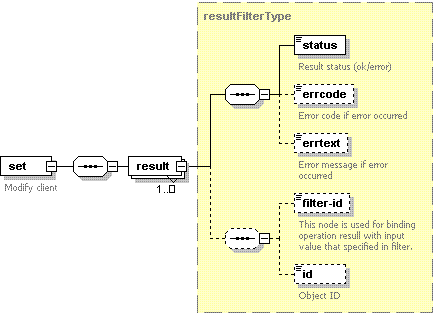Setting Customer Account Properties
The set operation is used to update Plesk customer account settings.
Request Packet Structure
A request XML packet setting various settings for the specified customer account includes the set operation node:
<packet version="1.6.3.0">
<customer>
<set>
...
</set>
</customer>
</packet>
The set node does not have a separate type, it is nested within the
ClientTypeRequest complex type (client_input.xsd). The set
node has the following graphics representation:

Note: The interactive schema navigator for all request packets is available here: http://plesk.github.io/api-schemas/1.6.8.0/agent_input.svg.
- The filter node is required. It specifies the filtering rule.
Data type: clientSelectionFilterType
(client_input.xsd). For more information on filters, refer to the Available Filters section. - The values node is required. It is used to specify the
categories of settings that will be set to Plesk database. Data type:
none.
- The gen_info node is optional. It specifies a collection of
general settings. Data type: clientSetGenInfo
(
plesk_client.xsd). See the structure of this node in topic General Customer Account Settings.
- The gen_info node is optional. It specifies a collection of
general settings. Data type: clientSetGenInfo
(
Response Packet Structure
The set node of the response packet is structured as follows:

Note: The interactive schema navigator for all response packets is available here: http://plesk.github.io/api-schemas/1.6.8.0/agent_output.svg.
- The result node is required. It wraps the result of the
requested set operation. Data type: resultType
(
common.xsd). - The status node is required. It returns the execution status of the set operation. Data type: string. Allowed values: ok | error.
- The errcode node is optional. Is used to return the error code when the set operation fails. Data type: unsignedInt.
- The errtext node is optional. Can be used to return an error message if the set operation fails. Data type: string.
- The filter-id node is optional. Returns the name or ID of a customer depending on a way of customer specification in the request packet. Data type: anySimple.
- The id node is optional. It is required if the set operation succeeds. Returns the unique identifier of the customer account just updated. Data type: integer.
Samples
Changing a customer GUID
You can change a customer GUID using the following packet:
<packet version="1.6.7.0">
<customer>
<set>
<filter>
<login>MyClient</login>
</filter>
<values>
<gen_info>
<guid/>
</gen_info>
</values>
</set>
</customer>
</packet>
Response:
<?xml version="1.0" encoding="UTF-8"?>
<packet version="1.6.7.0">
<customer>
<set>
<result>
<status>ok</status>
<filter-id>MyClient/filter-id>
<id>4</id>
</result>
</set>
</customer>
</packet>
Changing GUIDs of all customers
To change GUIDs of all customers, use the following packet:
<packet version="1.6.7.0">
<customer>
<set>
<filter/>
<values>
<gen_info>
<guid/>
</gen_info>
</values>
</set>
</customer>
</packet>
Response:
<?xml version="1.0" encoding="UTF-8"?>
<packet version="1.6.7.0">
<customer>
<set>
<result>
<status>ok</status>
<filter-id>3</filter-id>
<id>3</id>
</result>
<result>
<status>ok</status>
<filter-id>4</filter-id>
<id>4</id>
</result>
</set>
</customer>
</packet>